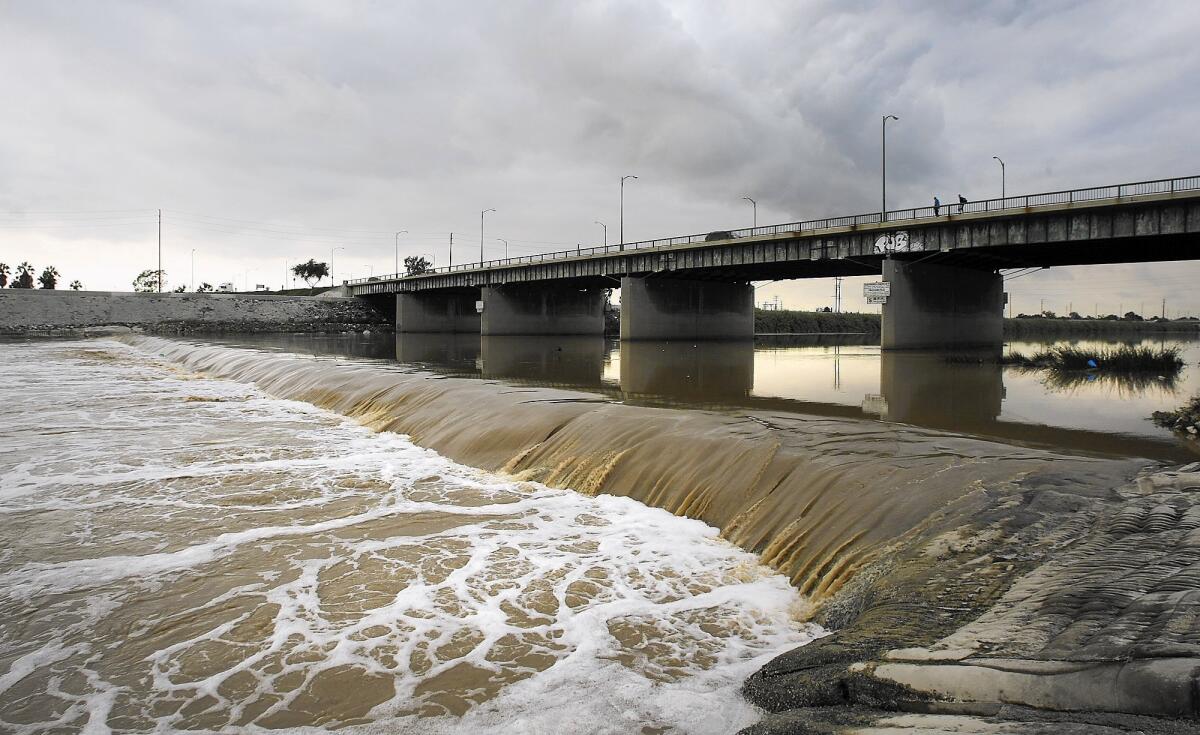Feinstein water policy bill could signal a compromise in sight

The Los Angeles River flows under the Anaheim Street bridge in Long Beach.
Reporting from Washington — Sen. Dianne Feinstein filed a 184-page water policy bill Wednesday, calling it one of the most difficult bills she’s worked on in 23 years representing California.
“This is the hardest thing I’ve done, because you look for the sweet spot, the balance, and it’s very difficult because it’s very polarized,” Feinstein said. “There are some that don’t want anything and there are some that want much more.”
California’s congressional delegation has long disagreed over how to respond to the Golden State’s water crisis, balancing protecting endangered species and preserving waterways against agricultural demand and drying wells.
Feinstein said the bill reflected two years of bipartisan meetings, consultation with federal, state and local groups and discussions with farmers and environmentalists.
“I can’t not do a bill. I represent the whole state. We’re in trouble drought-wise and this is not going to be the last drought we will have,” Feinstein said. “So I really think it’s important to try.”
The bill does not mandate how much water should be pumped from the Central Valley Project or the State Water Project, which each move water from Northern California to farms and cities in the south. Those decisions would be left in the hands of state and federal officials based on real-time monitoring of the turbidity, or cloudiness that draws smelt, of the water near pumps.
Feinstein said she couldn’t get buy-in on the idea to set pumping levels.
“The state wouldn’t support it. The state may not still support it and the federal government wouldn’t support it,” she said.
Giving discretion and flexibility over pumping levels is a way to work around those concerns, she said.
For the short term, the legislation includes provisions aimed at capturing water from El Niño storms. It would allow water agencies to increase pumping for more of the year, and they would no longer be required to “pay back” the increase by reducing pumping later.
For long-term water needs, her bill proposes to authorize $1.3 billion in funding for Western states for desalination, recycling and storage.
Previous water policy legislation from Feinstein hasn’t been heard in the Republican-controlled Senate.
Rep. David Valadao (R-Hanford) said the focus on infrastructure wouldn’t help people in his district now and that mandated pumping levels were absolutely necessary.
“The fact that the senator is pretty proud of the fact that it doesn’t change any of the pumping levels is not a good start,” Valadao said.
Valadao sponsored a water plan the House passed last year. It focuses on funneling more water to San Joaquin Valley growers by reducing the amount used to support endangered fish populations.
Valadao and House Majority Leader Kevin McCarthy (R-Bakersfield) both said they hoped the Senate moved quickly to pass Feinstein’s proposal so the House and Senate could meet to reconcile the differences between the policies.
If that actually happens, a compromise plan could land on President Obama’s desk this year.
“We are finally seeing rain in California, but we are losing — and not capturing — water to the ocean. My colleagues and I stand ready to work together to meet the challenge our state faces,” McCarthy said in a statement.
Some House Democrats immediately backed Feinstein’s bill.
Rep. John Garamendi (D-Walnut Grove) said he worked with the senator to make sure the bill included long-term infrastructure projects as well as short-term relief.
“It engages the federal government in the same type of projects that the state government is pursuing,” Garamendi said. “That is very important for the state.”
Garamendi said mandatory pumping levels were a nonstarter for him.
“As a matter of principle, never write into law a specific operational mandate because immediately the environmental circumstances won’t fit, so you’ll be doing something that makes no sense,” he said.
Rep. Jerry McNerney (D-Stockton) called the infrastructure projects in Feinstein’s bill “encouraging,” but said flexibility in operation of the pumps was “problematic.”
“We need to work together on the long-term goals for California,” McNerney said. “Focusing on taking water against local wishes for the betterment of another part of the state is not going to fly.”
Follow @sarahdwire on Twitter
Read more about the 55 members of California’s delegation at latimes.com/politics
ALSO
Californians clash over money for water
Democrats criticize GOP attempt to insert drought plan in federal spending bill
More to Read
Get the L.A. Times Politics newsletter
Deeply reported insights into legislation, politics and policy from Sacramento, Washington and beyond. In your inbox three times per week.
You may occasionally receive promotional content from the Los Angeles Times.











